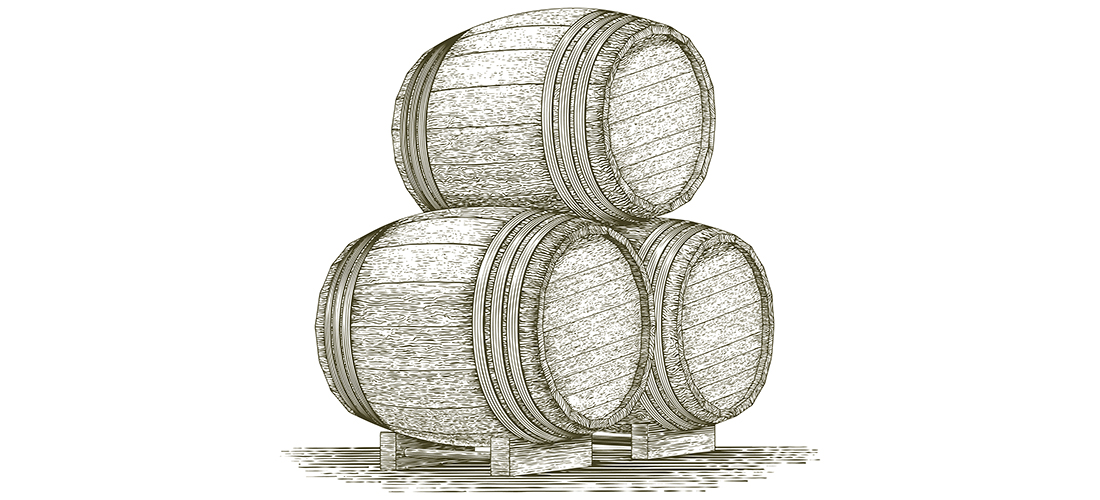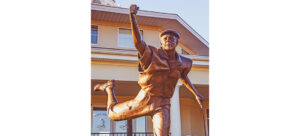
Moonshine Murder
The legacy of the Big Swamp meltdown
By Lisa Weiss
Every family has its secrets. Sometimes they’re taken to the grave or held close to the heart for safekeeping. And sometimes, as was the case for my family, the secret — Granddaddy landing in the gas chamber at Central Prison — made an indelible mark on the soul of a skinny 8-year-old boy who would later become my daddy.
Granddaddy Palmer was a so-called tobacco farmer from North Carolina, although he had never plowed a field that Daddy could remember. Instead, he let his son (my daddy) ride shotgun in the old Ford pickup while he delivered homemade whiskey to the locals. Palmer and his uncle by marriage, George Allen, were two of the biggest bootleggers in the county, and the two of them fought for bragging rights to the Big Swamp distillery business. Uncle George owned the 15-by-15-foot store at the intersection of Seventh Street and Singletary Church Road in Robeson County, so he had a natural distribution point for his product. But Palmer had the most prized asset: a reliable and abundant supply of sugar. In fact, he had 3,300 pounds of it in the backwoods of the Big Swamp, which ensured a constant flow of his moonshine mash.
Sugar during this time was rationed due to the war. Palmer’s secret stash, which in his mind was his patent, always kept him one step ahead of Uncle George. When he refused again and again to reveal his sugar source, Uncle George’s greed got the better of him, and he snitched to the local sheriff, spilling the location of Palmer’s stills. Naturally, festering contempt came stomping out of the backwoods. And with a loaded shotgun.
Walking a mile to Uncle George’s house that morning did not tamp Palmer’s temper, but rather gave rise to it. When he stormed into Uncle George’s house, George leapt from the breakfast table and fled out back, screaming for his wife to get his gun. Not intending to kill anyone — although he surely wanted to make his point — Palmer fired several shots between the siding of the barn where Uncle George went to hide.
Daddy and his siblings had scattered that morning when they witnessed their own father’s rage and their mother’s pleading. Crouched low and staring bug-eyed at the edge of the cotton field where a split in the path led either to the swamp or Uncle George’s, they waited. It did not take long. The sound of gunshots, paired with the frenzied resolve on Palmer’s face when he returned, kept them as silent as Uncle George’s barn.
Palmer rummaged through the house with a burlap sack as he prepared his getaway into the Big Swamp. He called for Blackeye, the family bulldog, who had a black ring the size of a hickory nut around his left eye, marking his reputation as a fighter. Palmer had paid $5 for him as a pup but when someone later offered $100 for him, he didn’t consider it. He loved that dog.
And so, with his dog, a quilt, a cast-iron skillet and a 5-gallon demijohn of moonshine, Palmer set out into the dark swamp to ride out the manhunt. As the minutes turned to hours, and then days, a sense of self-satisfaction and pride grew. Man and dog survived the elements. But while the moonshine soothed Palmer’s soul, Blackeye grew weary. Over the years, that dog had fought off rowdy strays, snarled at drunkards — would have done anything to protect his master. But Blackeye did not growl, budge or even nudge Palmer as six men in uniform approached them through the dark muck. Like most things in a swamp, the dregs rise up or their stench gives them away. The dog sighed. Granddaddy went to jail.
Uncle George had been carted off to the hospital in the back of a pickup truck. Gunshot wounds to the shoulder, leg and lower abdomen complicated by pneumonia sealed his fate. Following a two-day trial, Grandaddy Palmer was charged with first-degree murder and sentenced to the gas chamber. Some folks tasted sweet revenge, while others puckered from the sourness of it all.
When facing certain death, some men become remorseful and discover a sense of purpose. During the eight months it took Palmer to walk the green mile, he learned a little French, sought out the forgiveness of God and his family, and wrote letters . . . lots of letters. His conversion story was covered widely by the local and regional press. His letters were published and used in sermons across North Carolina and Virginia. He was fighting for his soul while his lawyer fought for his life. Despite his remorse, including a petition signed by all but two of the jurors, he was denied an appeal by the State Supreme Court. Daddy used to say, “I don’t think he hated to die as much as he hated to see what he had caused.”
On Feb. 19, 1943, a farmer turned bootlegger walked into the gas chamber at 10:01 a.m. in Raleigh, North Carolina. He smiled and nodded to the sheriff. His arms and legs were strapped to the wooden chair with a high back, a brown leather mask adjusted over his face. Any hopes and dreams were sealed in the airtight chamber.
I can’t say they thrived, but all six of his children survived to tell — or not — their own stories of Palmer. The tragic tale became family lore. Creased, worn letters and press clippings from this born-again inmate passed down from generation to generation. Stories and memories of Palmer fell into the crevices of time, aged and somewhat forgotten; yet, they had the power to expose a gnawing urge to seek out “the unarmed truth and unconditional love”* desperately craved by a family, and particularly, by a fatherless 8-year-old boy, tender and sweet, despite the lack of sugar in his life. PS
*From Dr. Martin Luther King Jr.’s 1964 Nobel Prize acceptance speech
A North Carolina native, Lisa Weiss is an interior designer and artist. She and her husband, Richard, live in the Charlotte area. Charles Meares, her father, served 41 years in the North Carolina Department of Corrections and was superintendent of the Gaston Correctional Center. He was twice the recipient of the Order of the Long Leaf Pine, granted by the office of Gov. Jim Hunt and again by the office of Gov. James Holshouser.





